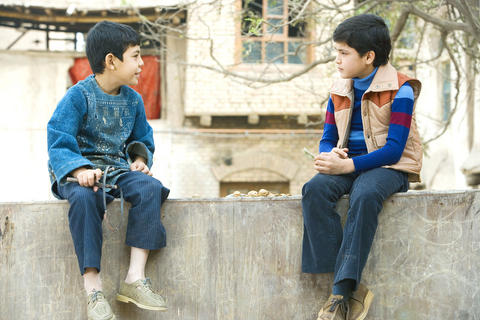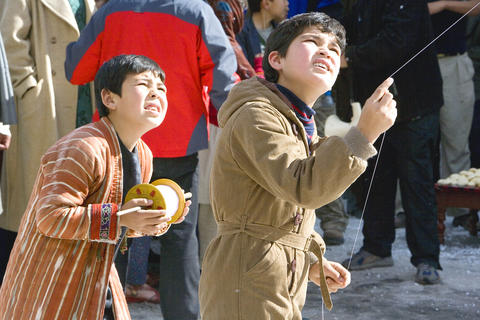Much like the best-selling novel on which it's based, The Kite Runner tells the story of an Afghan refugee who, long after arriving in the US, sifts through memories of his cosseted childhood, his emotionally remote father, his devoted best friend, the kites they flew and the stories they shared. The back of my paperback copy of this Khaled Hosseini novel is sprinkled with words like “powerful” and “haunting” and “riveting” and “unforgettable.” It's a good guess that this film will be rolled around in a similarly large helping of lard.
There's another word on the back of my copy: “genuine.” The portrait of Afghan culture broadly painted by its narrator, a 38-year-old novelist known as Amir (played in the film by the Scottish-born Khalid Abdalla), certainly seems like the real deal, a sense of authenticity underscored by the book's evocation of the Afghan diaspora in the US, its descriptions of traditions and rituals and the numerous foreign words like Kocheh-Morgha (Chicken Bazaar) and Shirini-khori (Eating of the Sweets' ceremony). That said, it is difficult to believe in the authenticity of any book (and its author) in which a born and bred Afghan narrator asks of the Taliban — as this one does in June 2001 — “Is it as bad as I hear?”
David Benioff's clumsy screenplay doesn't broadcast its political naivete as openly, but only because the filmmakers seem to assume that unlike the book's readers, the movie audience doesn't care about such matters. Benioff gestures in the direction of Communists and mullahs, the Soviet invaders and the Taliban insurgents, but none of these players figure into the story in any meaningful fashion. The director Marc Forster, following the script's lead, scrupulously avoids politics and history — there are no causes or positions, just villains and horrors — and instead offers us a succession of atmospheric, realistic landscapes, colorful sights and smiling boys. And kites. Lots and lots of bobbing, darting, high-flying kites.

PHOTO: COURTESY OF UIP
Like the recent film version of Ian McEwan's novel Atonement, another story ignited by the destructive behavior of a pubescent child, The Kite Runner presents a world informed by a variant of original sin. In both, a child's damaging words and deeds give way to — and seem to foreshadow and somehow even to incite — the larger violence of war. The two stories register very differently, both on the page and on screen, yet what's curious is how each presents childhood as an already corrupted state that is redeemed only by adult grace. In these stories war becomes a kind of cleansing agent for the destructive child, who, after enduring hardships, matures into a properly contrite adult (and a fiction writer to boot).
It takes a while for that contrition to surface in The Kite Runner. First the adult Amir has to conjure up a leisurely flashback during which his 12-year-old self (Zekiria Ebrahimi) rushes through the dust and the exotica — past the woman in a burka and the severed animal heads — pausing to read, write and fly kites. He worships his gruff father, Baba (Homayoun Ershadi), a businessman who swills alcohol and dismisses the mullahs as “monkeys.” Amir, in turn, is adored by the illiterate servant boy Hassan (Ahmad Khan Mahmoodzada), whose father has worked for Baba his entire life. Amir loves his younger friend in his selfish fashion, but because Baba favors Hassan (if not enough to educate the boy), Amir also betrays him.
Forster, who previously directed Monster's Ball and Finding Neverland, has been soundly defeated by The Kite Runner. Despite the film's far-flung locations (it was shot primarily in China), there is remarkably little of visual interest here; the setups are banal, and the scenes lack tension, which no amount of editing can provide. With the exception of Ershadi, whom art-house audiences may remember from Abbas Kiarostami's Taste of Cherry, it also lacks credible performances. The two lead child actors, both nonprofessionals, are predictably appealing, but only because they're children. Unlike Kiarostami, who has a genius for translating the natural rhythms of nonprofessional performers to the screen, who siphons real life and bottles it, Forster never makes you believe in these children or their woes.

PHOTO: COURTESY OF UIP
In both novel and film form, The Kite Runner recounts a simple yet shrewd story about that favorite American pastime: self-improvement. Amir's childhood mistake isn't a careless juvenile offense; it's a human stain that must be scrubbed out through self-abnegation, confession and personal transformation. Yet, watching this film, you are left to wonder whom precisely is all this suffering for — is it for Amir? Hassan? Afghanistan? Or do Hassan and the story's other sad children — especially those hollow-eyed boys and girls glimpsed during the preposterous climax in Taliban-controlled Afghanistan — suffer because it's possible to package other people's pain and turn it into a commercial diversion? It's no surprise that for all its foreign trappings, The Kite Runner tells the same old comforting story. We wouldn't have it any other way.

The canonical shot of an East Asian city is a night skyline studded with towering apartment and office buildings, bright with neon and plastic signage, a landscape of energy and modernity. Another classic image is the same city seen from above, in which identical apartment towers march across the city, spilling out over nearby geography, like stylized soldiers colonizing new territory in a board game. Densely populated dynamic conurbations of money, technological innovation and convenience, it is hard to see the cities of East Asia as what they truly are: necropolises. Why is this? The East Asian development model, with

June 16 to June 22 The following flyer appeared on the streets of Hsinchu on June 12, 1895: “Taipei has already fallen to the Japanese barbarians, who have brought great misery to our land and people. We heard that the Japanese occupiers will tax our gardens, our houses, our bodies, and even our chickens, dogs, cows and pigs. They wear their hair wild, carve their teeth, tattoo their foreheads, wear strange clothes and speak a strange language. How can we be ruled by such people?” Posted by civilian militia leader Wu Tang-hsing (吳湯興), it was a call to arms to retake

This is a deeply unsettling period in Taiwan. Uncertainties are everywhere while everyone waits for a small army of other shoes to drop on nearly every front. During challenging times, interesting political changes can happen, yet all three major political parties are beset with scandals, strife and self-inflicted wounds. As the ruling party, the Democratic Progressive Party (DPP) is held accountable for not only the challenges to the party, but also the nation. Taiwan is geopolitically and economically under threat. Domestically, the administration is under siege by the opposition-controlled legislature and growing discontent with what opponents characterize as arrogant, autocratic

When Lisa, 20, laces into her ultra-high heels for her shift at a strip club in Ukraine’s Kharkiv, she knows that aside from dancing, she will have to comfort traumatized soldiers. Since Russia’s 2022 invasion, exhausted troops are the main clientele of the Flash Dancers club in the center of the northeastern city, just 20 kilometers from Russian forces. For some customers, it provides an “escape” from the war, said Valerya Zavatska — a 25-year-old law graduate who runs the club with her mother, an ex-dancer. But many are not there just for the show. They “want to talk about what hurts,” she